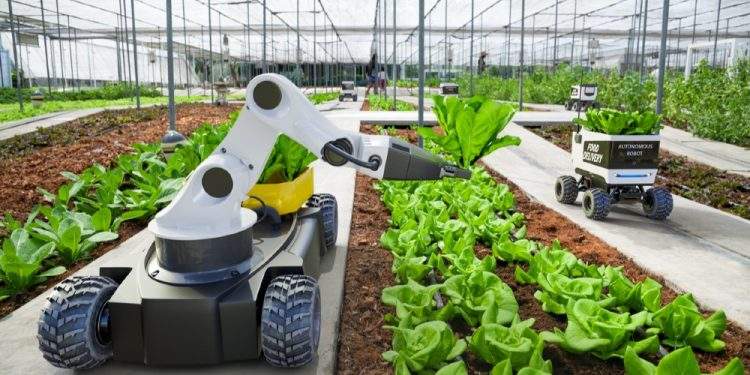Agricultural machinery company John Deere is planning to manufacture nothing but fully automated farming vehicles by 2030.
Jorge Heraud, vice president of automation and autonomy for John Deere, noted that he sees the company’s future as being a leader in the manufacturing of robotics and artificial intelligence-infused equipment alongside the tech giants of Silicon Valley. (Related: Warehouses turning to robots to fill labor gaps as e-commerce booms.)
John Deere showcased a glimpse of its future line of automated farming machinery last January when it unveiled its fully autonomous 8R farm tractor, driven by an AI rather than a farmer behind the wheel.
According to Heraud, the 8R is the culmination of Deere’s investments in automation, data analytics, GPS guidance, internet-of-things connectivity and software engineering. All of this research and development is a mix of homegrown research as well as the result of acquisitions and partnerships with agri-tech startups.
“This comes from our realization that technology is going to drive value creation and increase productivity, profitability and sustainability for farmers,” said Heraud. “The AI we use involves computer vision and machine learning.”
The science behind this technology was developed by Silicon Valley startup Blue River Technology, which John Deere acquired in 2017 for $305 million. The company’s “see and spray” robotics platform utilizes dozens of sophisticated cameras and processors to distinguish between crop plants and weeds when applying herbicides.
To help the 8R distinguish between weeds and crops are six pairs of stereo cameras that can “see” obstacles in the field like rocks, logs or people. These cameras can also determine the size of the obstacle and how far away it is from the tractor. The cameras then pass the images along through a deep neural network that analyzes the pictures and decides whether the tractor should stop or keep moving.
“We’ve curated hundreds of thousands of images from different farm locations and under various weather and lighting conditions,” said Heraud. “With machine learning, the tractor can understand what it’s seeing and react accordingly. This capability also allows the farmer, instead of being in the tractor, to operate it remotely while doing something else.”
John Deere purchasing startups that can bolster its agri-tech R&D
Stephen Volkmann equity research analyst at Jefferies, noted that while John Deere is making a big splash in automation, it is “very, very, very early in this process.”
He noted that the total global fleet of autonomous tractors the company has now “is less than 50.” The company’s plan is to have a fully autonomous farming system for row crops by 2030. “In Wall Street time, that’s an eternity,” said Volkmann.
For the time being, Volkmann noted that John Deere is creating value and profits for its well-established automated systems that can be installed onto its existing, manually-driven tractors, such as GPS-based self-steering and precision seeding.
While this is happening, John Deere is engaging in an aggressive expansion campaign by purchasing startups that could help further the company’s agri-tech research and development.
8R’s autonomous driving capabilities were initially developed by Bear Flag Robotics, a Silicon Valley startup launched in 2017. It was then purchased by John Deere for $250 million.
Bear Flag Robotics’ autonomous navigation system was used for 8R and can be retrofitted onto existing tractors to help farmers navigate.
In April, John Deere formed a joint venture with GUSS Automation, a tech company that devises semi-autonomous orchard and vineyard sprayers. The company’s tech can detect trees and their sizes and determine how much to spray.
A month later, John Deere acquired numerous patents and other intellectual property from AI startup Light. The company has a depth-perception platform that can improve upon existing stereo-vision systems with the help of additional cameras. John Deere plans to integrate Light’s platform into future versions of its autonomous farm vehicles.
To keep a close eye on other developments in the field of agri-tech John Deere has also established a “Startup Collaborator” program to test innovative technologies.
“The hope is that they find the diamonds before they become obvious to John Deere’s competitors and keep them in the fold,” said Volkmann.
- Concerned about your life’s savings as the multiple challenges decimate retirement accounts? You’re not alone. Find out how Genesis Precious Metals can help you secure your wealth with a proper self-directed IRA backed by physical precious metals.
Learn more about automation and artificial intelligence at Robotics.news.
Watch this video from Stefan Molyneux asking if automation leads to economic collapse.
This video is from the Stefan Molyneux channel on Brighteon.com.
More related stories:
- Robots replacing shelf stockers in Japanese convenience store chain.
- RULED BY SILICON: Airports turn to ROBOTS to enforce COVID protocols as air travel normalizes.
- Italian vineyards turning to robots and automation to fulfill harvest needs as labor shortage worsens.
- Restaurants look to ROBOTS to fill openings amid labor shortage.
- McDonald’s to test run AI-powered drive-thru windows that don’t need employees to take orders.
Sources include:
What Would You Do If Pharmacies Couldn’t Provide You With Crucial Medications or Antibiotics?
The medication supply chain from China and India is more fragile than ever since Covid. The US is not equipped to handle our pharmaceutical needs. We’ve already seen shortages with antibiotics and other medications in recent months and pharmaceutical challenges are becoming more frequent today.
Our partners at Jase Medical offer a simple solution for Americans to be prepared in case things go south. Their “Jase Case” gives Americans emergency antibiotics they can store away while their “Jase Daily” offers a wide array of prescription drugs to treat the ailments most common to Americans.
They do this through a process that embraces medical freedom. Their secure online form allows board-certified physicians to prescribe the needed drugs. They are then delivered directly to the customer from their pharmacy network. The physicians are available to answer treatment related questions.






What could possibly go wrong?